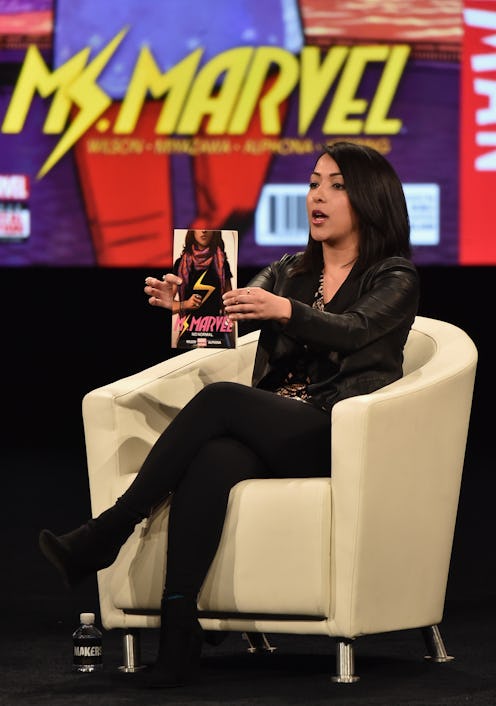Entertainment
Sana Amanat Made Marvel Comics Diverse
According to Marvel's director of content development Sana Amanat, who co-created Ms. Marvel, when she began working at Marvel Comics seven years ago, the company's comic book reading demographic was almost all older caucasian men. "About 25 percent of our audience was over 65. I realized 25 percent of our audience was literally dying," she says at the 2016 Makers conference. "[It was] a lot of old White guys who wanted our heroes to look a particular way, and it said so much about the direction the content was going in."
Amanat, who previously worked at an indie comic book publisher before moving to Marvel, has changed the game of the powerhouse publisher drastically over the course of her seven year stint. Not only did she bring Ms. Marvel, a Muslim American character from New Jersey to the company, but she's developed other characters, like a Korean American Hulk, a Black-Latino Spider-Man, a female Thor, and a female Captain Marvel into the Marvel sphere. "Captain Marvel used to wear a bathing suit and thigh high boots. But why do we have to strip down our women in order to show that they are powerful women?" Amanat asks.
She decided to remedy the problem by giving Captain Marvel a brand new look. Now, "she kicks ass, and wears this amazing looking uniform that's a little more comfortable than thigh-high boots," she explains. "We had a lot of hate mail saying we were destroying the classic Marvel hero. But it started a dialogue of showing authentic and realistic women in these stories. We have to remind our audiences that anyone can be a hero."
Ms. Marvel was just what the company needed. Not only was the character ethnically diverse, she was hugely profitable. But as Amanat discusses with Bustle, the comic book creator knew Ms. Marvel was a huge risk. "How do you convince an audience that this new character is worth it? What are her powers? What is her name? What are her vulnerabilities? The classic Peter Parker message is, 'With great power comes great responsibility,' so what was our line? We came down to, 'With great power comes great opportunity,' and the concept of: You can be anyone you want to be, you can be anyone you choose to be," she says. "People bought it, and they did so many times that we had seven printings of the first issue, which is pretty unheard of."
The "unheard of" sales were in large part due to how relatable the character herself was. As Amanat says, "It's not just young Muslim American women reading Ms. Marvel, It's everybody. It's the young Asian girl and the teenage gay boy, and the 57-year-old White man who said he'd been reading comics his whole life and this was his favorite. For me, I can't even pinpoint who the Ms. Marvel reader is, or who even the Marvel reader is anymore. That's really exciting, because we have upended our own expectation."
Ms. Marvel's first issue came out in February 2014, but with only two years of growth under her belt, she's still developing as her own superhero. "She's going to become a much bigger part of the Marvel universe. She's been looking up at her heroes for so long. She's been mesmerized by them and she's tried to be like them. Now she'll get to a place where she realizes she's one of them," she says. "But how do you deal with that? There's a lot of pressure when other people are looking at you and now you can't make a mistake. We will be elevating her, but she's still very, very young. She won't get to a place where she knows everything — we don't want her to know everything."
Outside of Ms. Marvel, Amanat wants to see other diverse characters emerge from Marvel's wheelhouse. "We need to tell more stories about homosexuality and transgender issues, and you don't do it by saying, 'We need to tell more stories about homosexuality and transgender issues.' You have to find who that right character is, and what their particular journey is," she says. "We also need to start thinking about what existing characters there are. We have a lot of great characters in our bank that we need to elevate. Why can't we make Captain America Black? Oh wait, we can. We need to find characters who can speak to these newer, emerging audiences that are looking for content that speaks to them. Because you're telling stories, you have a responsibility."
Images: Marvel
